|
|
| |
|
| |


SpringerBriefs in
Environment, Security, Development and Peace (ESDP)
A Peer-reviewed Book Series
Edited by
Hans Günter Brauch
Free University of Berlin and AFES-PRESS
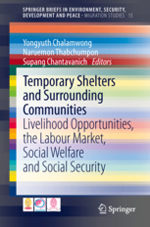 |
Vol 15 |
Yongyuth Chalamwong - Naruemon Thabchumpon, Supang Chantavanich (Eds.): Temporary Sheltered and Surrounding Communities. Livelihood Opportunities, the Labour Market, Social Welfare and Social Security. SpringerBriefs in Environment, Security, Development and Peace, vol. 15 – Migration Studies Subseries No. 2 (Cham – Heidelberg – New York – Dordrecht – London: Springer-Verlag, 2014).
ISBN (Print): 978-3-319-02788-3
ISBN (Online/eBook): 978-3-319-02789-0
DOI:
More on this book
Order Form
Order this book on the Springer Website
Order electronic version and individual chapters |
| |
|
|
-
Major empirical migration study by leading specialists from Chulalongkorn University (Bangkok) for the United Nations Development Programme (UNDP) •
-
The volume is helpful for anyone studying forced migration and its denouement in the globalized age
-
Focuses on livelihood opportunities, the labor market, social welfare and security in the temporary shelters and surrounding communities
This book is one of four volumes on a major empirical migration study by leading Thai migration specialists from Chulalongkorn University (Bangkok) for the United Nations Development Programme (UNDP).This volume reviews the livelihood opportunities for displaced persons in temporary shelters and in the surrounding communities. It explores labor-market conditions and provides recommendations for improving opportunities. The editors discuss the current policies of the Royal Thai Government towards displaced persons on restrictions for settlement that impede access to welfare, justice, education and health care. Service provision for displaced persons are identified here, as well as access to justice and other key services, including Thai services outside the settlements, and the potential for conflict with the local Thai population over resource allocation. Summarizing the results of a highly important research project this volume provides realistic policy recommendations for a durable solution for refugees at the borders. Policymakers from governments, international organizations and NGOs will benefit from its findings and conclusions.
Content Level » Research
Keywords » Development - Environment - Refugee and Peace - Security - Thai–Myanmar Border
Related subjects » Political Science - Population Studies
Table of contents
Introduction.- Research methodology and profiles of the shelters.- Literature review.- Thai labour market.- Survey findings.- Conclusion and recommendations.- Conceptual Framework.- Current situation of Social Welfare and Social Security.- Potential access to Thai services.- Conclusion and recommendations.- References.
| Vol 16 |
Suwattana Thadaniti, Supang Chantavanich (Ed.): The Impact of Displaced People’s Temporary Shelters on Their Surrounding Environment. SpringerBriefs in Environment, Security, Development and Peace, vol. 16 – Migration Studies Subseries No. 3 (Cham – Heidelberg – New York – Dordrecht – London: Springer-Verlag, 2014).
ISBN (Print): 978-3-319-02841-5
ISBN (Online/eBook): 978-3-319-02842-2
DOI:
More on this book
Order Form
Order this book on the Springer Website
Order electronic version and individual chapters |
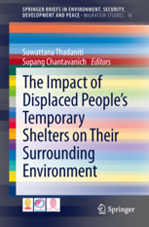
|
| |
|
|
-
Major empirical migration study by leading Thai migration specialists from Chulalongkorn University (Bangkok) for the United Nations Development Programme (UNDP) with EU support
-
Forced Migration on the border between Myanmar and Thailand
-
Focus on the impact of displaced people’s temporary shelters on their surrounding environment
This book is one of four volumes on a major empirical migration study by leading Thai migration specialists from Chulalongkorn University (Bangkok) for the United Nations Development Programme (UNDP).this volume discusses the environmental impact of temporary shelters for displaced people along the Thai–Myanmar border. Of nine shelters, three were selected for detailed study: Ban ThamHin (Ratchaburi province), Ban Mai NaiSoi (Mae Hong Son province), and Ban Mae La (Tak province). For each shelter, various research methods were used to assess the environmental conditions, analyse the ways of living and use of resources by displaced persons, and disclose their perceptions of the environmental conditions they face. The environmental impact of the shelters on the surrounding areas were also assessed by listening to officials and representatives. The book provides realistic policy recommendations for a durable solution for refugees at the borders. Practitioners and policymakers from governments, international organizations and NGOs will benefit from its findings. The volume is also helpful for anyone studying forced migration and its denouement in the age of globalization.
Content Level » Research
Keywords » Displaced Persons' Self Reliance - Environmental Conditions - Environmental Impacts - Temporary Shelter's Surroundings - Use of Resources
Related subjects » Political Science - Population Studies
Table of contents
Introduction.- Desk Review.- Displaced persons’ temporary settlement along the Thai-Burmese Border: State of Affairs from an environment perspective.- Way of Living and Resource Utilisation of the Displaced People.- Environmental Impact Assessment of the Displaced People’s Temporary Shelter.- Conclusions and Recommendations.
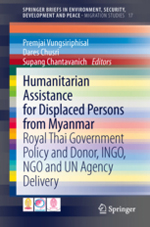 |
Vol 17 |
Premjai Vungsiriphisal, Dares Chusri, Supang Chantavanich (Eds.): Humanitarian Assistance for Displaced Persons from Myanmar. Royal Thai Government Policy and Donor, INGO/NGO and UN Agency Delivery SpringerBriefs in Environment, Security, Development and Peace, vol. 17 – Migration Studies Subseries No. 4 (Cham – Heidelberg – New York – Dordrecht – London: Springer-Verlag, 2014).
ISBN (Print): 978-3-319-02794-4
ISBN (Online/eBook): 978-3-319-02795-1
DOI:
More on this book
Order Form
Order this book on the Springer Website
Order electronic version and individual chapters |
| |
|
|
-
Major empirical migration study by leading Thai migration specialists from Chulalongkorn University (Bangkok) for the United Nations Development Programme (UNDP)
-
Forced Migration on the border between Myanmar and Thailand
-
Focus on Royal Thai Government policy and donor, INGO/NGO and UN Agency delivery of humanitarian assistance for displaced persons from Myanmar
This book is one of four volumes on a major empirical migration study by leading Thai migration specialists from Chulalongkorn University (Bangkok) for the United Nations Development Programme (UNDP). This volume examines the protracted refugee situation at the Thai–Myanmar border. Displaced persons are kept in closed settlements, and this has limited their self-reliance. A resettlement program has been implemented and many refugees have been accepted in resettlement countries. Repatriation is not recommended as a durable solution unless Myanmar becomes a safe place for return. Funding and intervention policies of international organizations and NGOs vary. Donors prefer to switch humanitarian assistance to development aid. The book provides realistic policy recommendations for a durable solution for refugees at the borders. Practitioners and policymakers from governments, international organizations and NGOs will benefit from its findings. The volume is also helpful for anyone studying forced migration and its denouement in the globalized age.
Content Level » Research
Keywords » Donors and Stakeholders' Roles - Durable Solutions - International Intervention - Thai Govermment Policy on Refugees - Thai-Myanmar Border
Related subjects » Political Science - Population Studies
Table of contents
Analysis of the Royal Thai Government Policy towards Displaced Persons from Myanmar.- Introduction.- Literature Review.- RTG policy toward displaced persons from Myanmar: development and current status.- RTG policy and needs of displaced persons.- Solutions and policy options.- Conclusions and recommendations.- Analysis of the Royal Thai Government Policy and of Donor, INGO/NGO and UN Agency Delivery of Humanitarian Assistance for Displaced Persons from Myanmar.- Introduction.- Literature Review.- Funding policy, project implementation strategies and cooperation strategies with the RTG.- Dynamics, needs and constraints of stakeholders.- Positive and negative impacts of existing intervention mechanisms, including gender related aspects.- Limitations and constraints on effective intervention mechanisms.- Conclusions and recommendations.
| Vol 18 |
Benjamin Harkins, Supang Chantavanich (Eds.): Resettlement of Displaced Persons on the Thai-Myanmar Border. SpringerBriefs in Environment, Security, Development and Peace, vol. 17 – Migration Studies Subseries No. 4 (Cham – Heidelberg – New York – Dordrecht – London: Springer-Verlag, 2014).
ISBN (Print): 978-3-319-02791-3
ISBN (Online/eBook): 978-3-319-02792-0
DOI:
More on this book
Order Form
Order this book on the Springer Website
Order electronic version and individual chapters |
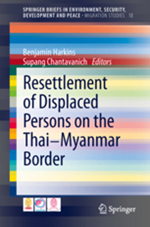
|
| |
|
|
-
Fourth volume of a major empirical migration study by migration specialists from Chulalongkorn University (Bangkok) for the United Nations Development Programme (UNDP)
-
Focuses on the cross-border migration between Myanmar and Thailand
-
Describes the process and prospects for resettlement of displaced persons
This book is one of four volumes on a major empirical migration study by leading Thai migration specialists from Chulalongkorn University (Bangkok) for the United Nations Development Programme (UNDP).The camps on the Thai–Myanmar border are the result of the world’s largest resettlement program. However, despite large-scale financial and human resource engagement, little research exists on how successful this resettlement has been. This book provides the first insight on how realistic the policy recommendations are for a durable solution for refugees at the borders. Practitioners and policymakers from governments, international organizations and NGOs will benefit from its findings. The volume is also helpful for anyone studying forced migration and its denouement in the age of globalization.
Content Level » Research
Keywords » Durable Solutions - Integration - Refugee - Resettlement - Thai–Myanmar Border
Related subjects » Political Science - Population Studies
Table of contents
Research Approach.- Desk Review Of The Resettlement Programme.- Asylum Country Results and Analysis.- Resettlement Country Results and Analysis.- Conclusion and Recommendations.
On the Coeditors of the four volumes
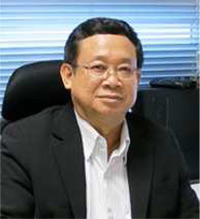 |
Dr. Yongyuth Chalamwong (Thailand) is a Research Director and Labour eExpert at Thailand Development Research Institute (TDRI). He has served as Project Director for a wide range on of planning evaluations in many studies on of manpower demand and supply and skills development; informal labour; child and forced labour; international labour migration in ASEAN; human resources and development; Thai social security, transport and communication etc. His research focuses on labour market, migration and economic policies. He has also served as a lecturer on business research, agricultural policy and resource economics. He has produced a number of books and journal articles on international migration and the labour market in Asia, labour migration and recent financial crisis, regional economic integration and agricultural administration, land policies and farm productivity, and rural off-farm income and employment.In 1989,he was awarded professional excellence in recognition of superior achievement in Agricultural Economics as exemplified by Quality of Research Discovery by the American Agriculture Economics Association.
Address: Dr. Yongyuth Chalamwong, Thailand Development Research Institute,Ram Kamhaeng 39, Ram Kamhaeng Road, Bangkok 10310, Thailand.
Email:<yongyuth@tdri.or.th>
Website: <http://tdri.or.th>. |
| |
|
|
Supang Chantavanich(Thailand) is a professor emeritus at the Faculty of Political Science, Chulalongkorn University. She is also the director of the Asian Research Center for Migration (ARCM) within the Institute of Asian Studies at Chula. During 2010–2011, she cooperated with UNDP to lead the research project “Sustainable Solutions to the Displaced Person Situation on the Thai–Myanmar Border” with EU funding. The project covered six studies of situational and policy analyses of displaced persons along the western borders in Thailand. The studies are finally revised into Springer Briefs in Environment, Security, Development and Peace (ESDP), Volumes 15, 16, 17 and 18.
After she graduated in Sociology from the University of Grenoble, France, Supang Chantavanich focused her teaching and research areas on South East Asian society and culture, sociological theories, qualitative research, migration and development, the overseas Chinese, education and health care of migrant people, and labour migration and forced migration including refugee and human trafficking. Recently, she led a research team at ARCM which conducted a study of migrant fishermen from Myanmar and Cambodia in Thailand with the International Labour Organization. Another regional study on “Politics, Governance, Experience and Response to Flooding from the Locals’ and Migrants’ Perspective in ASEAN”is currently being conducted with researchers from eight ASEAN countries. The study addresses human security and conflicts among people affected by floods in the region.
Address: Prof. Supang Chantavanich, Asian Research Centre for Migration, Institute of Asian Studies, Chulalongkorn University, Phayathai road, Bangkok 10330, Thailand.
Email:<supang.c@chula.ac.th>
Website: <http://arcmthailand.com>. |
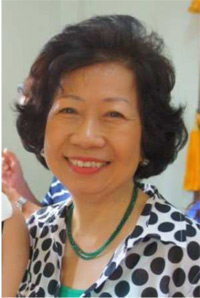
|
| |
|
|
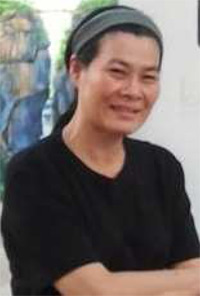 |
Dares Chusri (Thailand) received a PhD in Public Health from the College of Public Health Sciences, Chulalongkorn University, Bangkok. She has long experience in working for displaced persons (both migrants and refugees) in humanitarian work and development assistance programmes since 1980. She served with CARE International and the International Committee of the Red Cross (ICRC) for the Cambodian refugee camp at Site 8 and Khao-I-Dang, Aranyaprathet from late 1988 until the refugees were repatriated in 1993. While pursuing her studies, she has carried out a remarkable amount of consultancy, to conduct a large health project using qualitative evaluation techniques and tools and community-based approaches to work with marginalized and coastal community groups in southern Thailand with many organizations including IFRC, IOM and ECT—for whom she conducted research on HIV-AIDS awareness and responses among migrant workers, and the Human Rights Center at UC-Berkeley, for whom she co-authored a publication in 2005. As a Country Director of USCRI Thailand, her efforts to advocate for refugees’ right to work have reached the Thai parliament and public. She is also affiliated to ARCM as a consultant conducting surveys and qualitative study related to Myanmar refugees in Thailand for UNDP and UNFPA. Current, she is an independent researcher specializingin project evaluation, qualitative research, HIV/AIDS, TB, migrant workers and refugees, networking and policy advocacy.
Address: Dr. Dares Chusri, Asian Research Centre for Migration, Institute of Asian Studies, Chulalongkorn University Phayathai road, Bangkok 10330, Thailand.
Email: <dares_c@hotmail.com>.
Website: <http://www.arcmthailand.com/>. |
| |
|
|
Benjamin Harkins (United Kingdom) is a migration specialist who has worked extensively on research and interventions in Southeast Asia for international organizations and NGOs. He is currently employed as the Regional Monitoring and Evaluation Consultant for ILO’s Tripartite Action to Protect Migrant Workers in the Greater Mekong Sub-region from Labour Exploitation (TRIANGLE) in Bangkok, Thailand. Previously, he worked with the Asian Research Center for Migration as a senior researcher on a series of applied research projects, including regulating recruitment of migrant workers, working conditions in the fishing sector, and refugee resettlement.
Among his major publications are: Chantavanich, S., Laodumrongchai, S., Jitpong, W., Harkins, B., Yothinneeranath, P., Tunon, M., and Olsen, A. (2013). Employment Practices and Working Conditions in Thailand's Fishing Sector. Bangkok: ILO; Harkins, B., Laodumrongchai, S., Sangnaet, N., and Makcharoen, P. (2013). Regulating Recruitment of Migrant Workers:An Assessment of Complaint Mechanisms in Thailand. Bangkok: International Labour Organization; Srikhatthanaprom, P., and Harkins, B. (2012). The Right Skills for the Job: A Case study of Labor Supply and Demand in Special Economic Zones in Cambodia and Laos. Khon Kaen: Mekong Institute <http://www.mekonginstitute.org/images/abook_file/right_skills_2012.pdf>; Harkins, B. (2012). Beyond “Temporary Shelter”: A Case Study of Karen Refugee Resettlement in St. Paul, Minnesota. Journal of Immigrant & Refugee Studies, 10(2) <http://www.tandfonline.com/doi/abs/10.1080/15562948.2012.674326>; Harkins, B. (2010). Reevaluating Pro-Poor Health Care: A Model for Monitoring of the Universal Coverage Scheme in Thailand. Journal of Alternative Perspectives in the Social Sciences, 2,2 <http://www.japss.org/JAPSSDec2010.html>.
Address: Benjamin Harkins, Condo One X, 48/265 Sukhumvit 26, Klongtan, Klongtoei, Bangkok 10110, Thailand.
Email: <benharkins@gmail.com>.
Website: <http://www.linkedin.com/in/bharkins>.
|
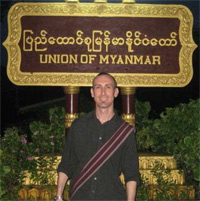
|
| |
|
|
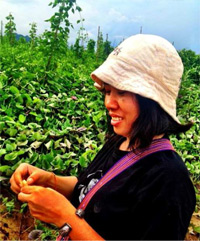 |
Assistant Prof. NaruemonThabchumpon (Thailand), PhD is currently researching Thai foreign direct investment in Greater Mekong Subregion countries and its impact on human security and democracy. Her latest publicationsare a Thailand chapter in Terrence Chong and Stefanie Elies (eds.), An ASEAN Community for All: Exploring the Scope of Civil Society Engagement, Singapore: International Press, pp. 161–184,and a research paper, co-written with Prof. Duncan McCargo, PhD, entitled “Urbanized Villagers in the 2010 Thai Redshirt Protests: Not Just Poor Farmers?” in Asian Survey, Vol. 51, No.6, pp. 993–1018.
Address: Assistant Prof. NaruemonThabchumpon, Master of Arts in International Development Studies, Faculty of Political Science, Chulalongkorn University, Phayathai road, Bangkok 10330, Thailand.
Email: <junaruemon@hotmail.com>.
Website: <http://www.ids.polsci.chula.ac.th>. |
| |
|
|
Dr. SuwattanaThadaniti (Thailand) is a Senior Lecturer in the Department of Urban and Environmental Planning, Faculty of Architecture at Chulalongkorn University and an Advisor to the Chulalongkorn University’s Social Research Institute (CUSRI).She has also worked as a Consultant to M.H. Planning and Development Co., working in conjunction with SumetJumsai Associates Co., AEC and Four Aces Co., for theChieng Mai Tourism Master Plan where she was responsible for Physical Planning and Environmental Impact Evaluation and as a National, Economic and Social Development Subcommittee Member to draft the Urban Development Plan and Land Use Policies in the Fifth National Development Plan of Thailand in 1982.She was a Consultant to UN-ESCAP (Economic and Social Commission for Asia and the Pacific) during 1987–88 where she conducted a field study on land use in major cities, focusing on metropolitan fringe development, and as a Consultant to the Royal Forest Department, Ministry of Agriculture and Cooperatives in 1993. Dr. Suwattana’s recent appointments includeConsultant to the Department of Town and Country Planning, Ministry of the Interior, to conduct research on ‘Coastal Area Development and Planning’ in 2010. Her research focuses on Strategic Area Development Approaches for Implementing Metropolitan Development, Comprehensive Planning for Urban Development, Rehabilitation Planning for Community Environment and Settlement Development in the Tsunami Disaster Area, Urban Residential Development Planning, and the Impact of Displaced People’s Temporary Shelters on Their Surrounding Environment.
|
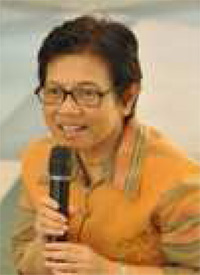
|
| |
|
|
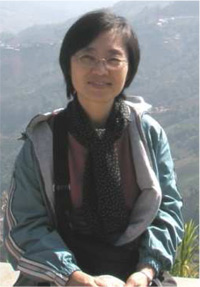 |
Premjai Vungsiriphisal (Thailand) is a senior researcher at the Asian Research Center for Migration(ARCM), Institute of Asian Studies, Chulalongkorn University. She completed her MA in Public Health Culture Studies at Mahidol University. Her PhD on Educational Policy Alternatives for Children of Migrant workers in Thailand Within the ASEAN Context is being undertaken at the Faculty of Education, Chulalongkorn University. Her research covers various aspects of migrant issues. Her past research includes work on Migrant children in difficult circumstances in Thailand, Cross-border Migration and HIV Vulnerability on the Thai–Myanmar Border, Children Caught in Conflict: Case study of refugee children along the Thai–Myanmar Border, Assessing the situation of the worst forms of child labour in Samutsakorn, Cultural aspects of the Thailand–Cambodia relationship: Case Study in Surin Province, Contemporary art and cultural diversity in Thailand, Research and development of education modules for migrant children in the border area, Migration and Deception of Migrant Workers in Thailand, and Sustainable Solutions to Displaced Persons along the Thai–Myanmar Border: Analysis of RTG Policy. During 2006–2008, she initiated and coordinated a series of Think-Tank Forums on Education for Migrant and Refugee Children, with participants from various Government offices and Non-GovernmentalOrganizations. She was granted a Mellow Fund Fellowship to be a visitor at the Refugee Studies Centre, Oxford University, UK during August–September 2007, and EU–Asia Link funding for a staff exchange with the Institute of Social Studies, the Hague, Netherlands, during August–October 2009. Recently she was a Visiting Research Scholar at the Graduate School at the African and Asia Areas Study, Kyoto University, during August–October 2011.
Address: Ms. Premjai Vungsiriphisal, Asian Research Centre for Migration, Institute of Asian Studies, Chulalongkorn University Phayathai road, Bangkok 10330, Thailand.
Email:<premjai.v@gmail.com> .
Website: <http://www.arcmthailand.com/>. |
| |
|
|
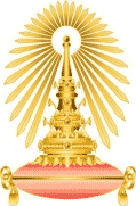
Chulalongkorn University
Chulalongkorn University, Thailand's first institution of higher education, officially came into being in March 1917. The groundwork and preparation for it in terms of planning and development, however, took place more than a century ago. The worldwide economic, social and political changes in the late nineteenth century contributed to Siam’s decision to adapt herself in order to avoid conflict with the Western powers (“Siam” became “Thailand” in the year 1939). Thus the royal policy of King Chulalongkorn (Rama V) was to strengthen and improve government so that the country could successfully resist the tide of colonialism. One of the major parts of the policy, which would later prove to be deep-rooted and highly effective, was to improve the Siamese educational system so as to produce capable personnel to work in both the public and private sectors. As a result, a school was founded in 1871 at the Royal Pages’ Barracks within the Grand Palace compound.
The development of Chulalongkorn University continued. From 1934 to 1958, the university emphasized the improvement of undergraduate education, and more faculties were established. In 1961 the university set up the Graduate School to be responsible for graduate-level education. From 1962 till the present, the university has focused on graduate education and has set up research centres and institutes. The University, known familiarly as “Chula”, has grown constantly in the near-century since its founding.
At present Chulalongkorn University is composed of 19 faculties, 23 colleges and 17 research institutes. Currently there are over 38,000 students including 24,951 undergraduates, 13,391 postgraduates (10,881 on the Master’s Degree and 2,150 on the Doctoral Degree programmes) and 2,800 faculty members. Its 87 international programmes have enjoyed a long and deserved high reputation for all-round academic attainment.
According to many Asian university rankings, Chulalongkorn University is Thailand’s highest-ranked institution, with the highest scores in many subjects including Arts and Humanities, Social Sciences and Management, Natural Sciences, Engineering and Technology, and Life Sciences and Medicine.
Chulalongkorn University’s Strategy 2012–2016 has been undertaken to formulate guidelines for the university’s development plan. The initiative focuses on different aspects of development and improvement with the objective of raising the university to a level of excellence that will qualify it as a “World Class National University” and as the “Pillar of the Kingdom”.
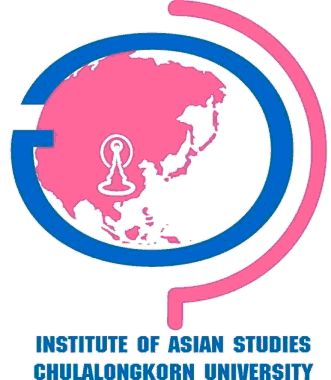
The Institute of Asian Studies (IAS)
The Institute of Asian Studies (IAS) is an interdisciplinary research, teaching and service organization. IAS was established in 1967 as a unit within the Faculty of Political Science at Chulalongkorn University. After a considerable expansion of activities at IAS in 1979, an upgrade in the Institute’s status was determined to be necessary. Consequently, on 10 May 1985, IAS was officially recognized as a separate institute at Chulalongkorn University, granting IAS a status equivalent to that of a faculty at the university.
Today, the strategic vision for IAS is to continue to serve the Thai community and the Asian region as a source of knowledge and expertise for a broad range of subject areas in the region including economic, social, political, and security concerns. This has been accomplished through the diligence and cooperation of a team of highly-qualified researchers who possess specialized knowledge about each country and subregion within Asia.
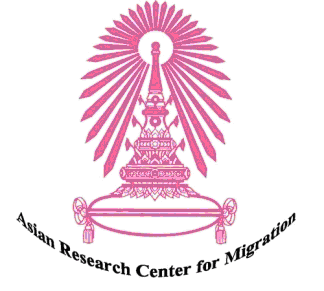
Asian Research Center for Migration
The Asian Research Center for Migration, based at the Institute of Asian Studies of Chulalongkorn University, is an internationally recognized centre of excellence in social science research. Located on the historic campus of Chulalongkorn University in the heart of Bangkok, ARCM is an important contributor to the research output of Thailand’s oldest and most respected institution of higher learning, conducting critical policy-relevant research on international migration into, out of and within the South East Asian Region.
History
ARCM was initially founded in 1987 as the Indo-Chinese Refugee Information Center. The Center was established with the mission of conducting research on the flows of refugees from Cambodia, Laos, Vietnam and other South East Asian countries seeking asylum in Thailand. After the Indo-Chinese refugee crisis had abated in Thailand and the refugee camps were closed under the Comprehensive Plan of Action, the Center began to conduct research on new refugee situations that had begun to emerge in South East Asia.
In recognition of this newly broadened research focus, the Center was reconstituted as the Asian Research Center for Migration in 1995. Since that time, the thematic areas of ARCM’s research have expanded significantly and now include projects on all forms of international migration in South East Asia with a particular emphasis on Thailand as a sending, receiving and transit country.
Research Activities
Through published research, statistical data, consultation and policy recommendations related to cross-border migration in the South East Asia Region, the objective of ARCM’s research activity is to support evidenced-based decision-making by governments, international agencies, and private sector organizations on migration-related issues. These activities are conducted by a multidisciplinary team of committed researchers, including both Thai and international experts, with backgrounds in a diverse range of academic fields relevant to migration such as sociology, anthropology, political science, economics and law.
|
|
|